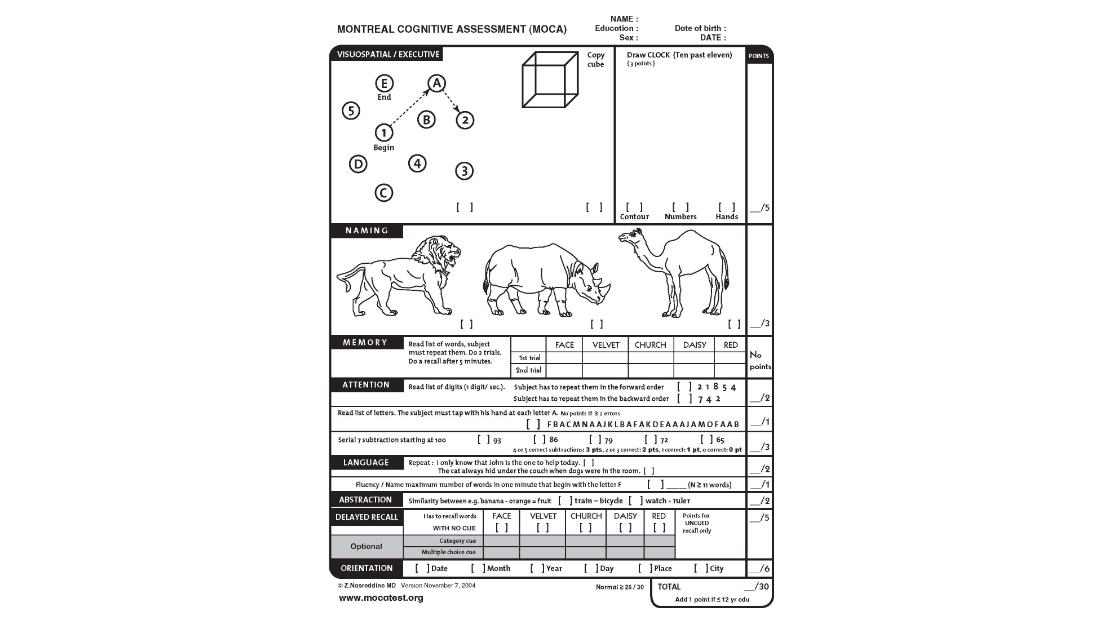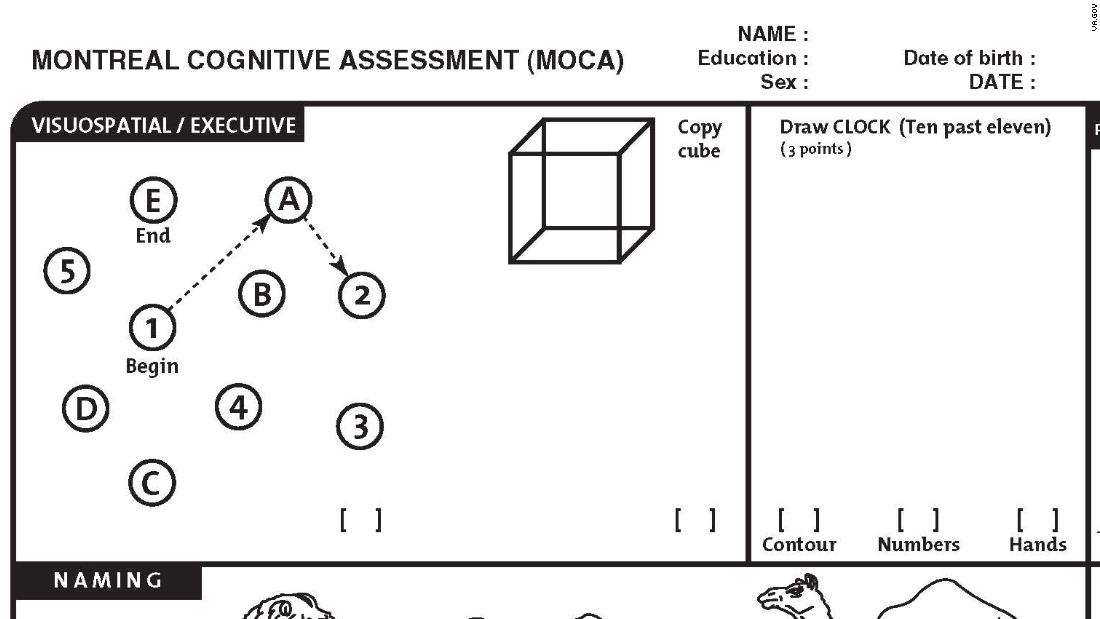Former President Donald Trump's cognitive abilities have been a subject of public curiosity and debate. The term "Trump Cognitive Test" has gained significant attention, especially in discussions surrounding leadership and mental health. This article delves into the intricacies of cognitive assessments, their relevance to public figures, and the broader implications of such evaluations. If you've ever wondered about the specifics of cognitive testing and its application to prominent individuals, this is the definitive guide for you.
The debate around cognitive tests for leaders like Donald Trump highlights the importance of mental fitness in high-stakes roles. Cognitive assessments are designed to evaluate various aspects of brain function, including memory, attention, and problem-solving skills. As public interest grows, understanding the purpose and methodology of these tests becomes crucial.
This article aims to provide a thorough exploration of the Trump Cognitive Test, examining its background, significance, and implications. Whether you're a political enthusiast or simply curious about cognitive health, this content will offer valuable insights supported by credible sources and expert analysis.
Read also:Aishah Sofey Onlyfans A Comprehensive Guide To Her Career Content And Impact
Table of Contents
- Introduction to Cognitive Testing
- Donald Trump's Background
- Types of Cognitive Tests
- The Trump Cognitive Test
- Significance of Cognitive Testing for Leaders
- Public Reaction and Media Coverage
- Expert Opinions and Analysis
- Legal and Ethical Considerations
- Future Directions in Cognitive Assessments
- Conclusion and Final Thoughts
Introduction to Cognitive Testing
Cognitive testing is a scientific approach used to assess an individual's mental capabilities. These tests evaluate various cognitive functions, such as memory, attention, language, and problem-solving. They are commonly used in medical, educational, and professional settings to identify potential cognitive impairments or measure cognitive strengths.
Importance of Cognitive Tests
For public figures, cognitive tests can serve as a tool to ensure mental fitness for duty. Leaders, especially those in high-pressure roles, require sharp cognitive abilities to make informed decisions. The relevance of cognitive testing in this context cannot be overstated, as it provides valuable insights into an individual's mental health and capacity.
Common Misconceptions
Despite their importance, cognitive tests are often misunderstood. Many people believe these tests are solely for diagnosing dementia or Alzheimer's disease. However, they serve a broader purpose, offering a comprehensive evaluation of mental abilities across different domains.
Donald Trump's Background
Donald J. Trump, the 45th President of the United States, has been a polarizing figure throughout his career. Known for his business acumen, media presence, and political strategies, Trump's leadership style has sparked widespread discussion. Below is a summary of his key biographical details:
| Full Name | Donald John Trump |
|---|---|
| Date of Birth | June 14, 1946 |
| Place of Birth | Queens, New York, USA |
| Occupation | Businessman, Television Personality, Politician |
| Political Affiliation | Republican Party |
Types of Cognitive Tests
Cognitive tests come in various forms, each designed to assess specific aspects of mental function. Below are some of the most common types:
- Memory Tests: Evaluate short-term and long-term memory retention.
- Attention Tests: Measure the ability to focus and sustain attention.
- Language Tests: Assess verbal fluency and comprehension skills.
- Executive Function Tests: Examine problem-solving and decision-making abilities.
Standardized vs. Non-Standardized Tests
Standardized cognitive tests follow a fixed set of procedures and scoring criteria, ensuring consistency across evaluations. Non-standardized tests, on the other hand, are more flexible and tailored to specific needs, though they may lack universal validity.
Read also:Credence Clearwater Revival A Journey Through Rock And Roll History
The Trump Cognitive Test
The term "Trump Cognitive Test" refers to the cognitive assessment conducted on Donald Trump during his presidency. This test was part of a broader medical evaluation aimed at ensuring his mental fitness for office. The Montreal Cognitive Assessment (MoCA) was reportedly used, a widely recognized tool for detecting mild cognitive impairments.
Key Findings
According to White House physician Dr. Ronny Jackson, Trump scored 30 out of 30 on the MoCA, indicating no cognitive impairment. However, the results sparked debate among experts and the public, with some questioning the test's adequacy in capturing complex cognitive functions.
Significance of Cognitive Testing for Leaders
Cognitive testing for leaders is crucial, as it ensures they possess the mental acuity required for effective decision-making. High-stakes roles demand individuals who can process information quickly, think critically, and respond appropriately to challenges. Cognitive assessments provide an objective measure of these capabilities, fostering transparency and accountability in leadership.
Challenges in Implementation
Implementing cognitive tests for leaders presents several challenges, including resistance from the individuals being evaluated and concerns over privacy. Striking a balance between public interest and personal privacy remains a key consideration in this domain.
Public Reaction and Media Coverage
The announcement of Trump's cognitive test results generated significant media attention and public reaction. Supporters praised the results as proof of his mental sharpness, while critics questioned the test's validity and potential biases. The media played a pivotal role in shaping public perception, often amplifying debates and discussions surrounding the issue.
Impact on Public Perception
Public perception of cognitive testing for leaders can influence trust and confidence in governance. Transparent and credible evaluations help build trust, while skepticism or misinformation can erode it. Ensuring accurate and balanced reporting is essential for maintaining public confidence in such assessments.
Expert Opinions and Analysis
Experts in psychology and neuroscience have weighed in on the significance of cognitive testing for leaders. Many emphasize the importance of using validated tools and interpreting results within a broader context. While cognitive tests provide valuable insights, they should not be viewed as definitive measures of leadership capability.
Limitations of Cognitive Tests
Cognitive tests have limitations, including potential biases, variability in performance, and the inability to capture all aspects of mental function. Experts stress the need for comprehensive evaluations that consider multiple factors, including emotional intelligence and situational awareness.
Legal and Ethical Considerations
The use of cognitive tests for leaders raises important legal and ethical questions. Privacy concerns, informed consent, and potential misuse of results are critical issues that must be addressed. Ensuring that evaluations are conducted ethically and legally is paramount to maintaining public trust and upholding professional standards.
Regulatory Frameworks
Regulatory frameworks governing cognitive testing vary by jurisdiction, but common principles include confidentiality, transparency, and accountability. Establishing clear guidelines and oversight mechanisms can help mitigate risks and enhance the credibility of such assessments.
Future Directions in Cognitive Assessments
Advancements in technology and neuroscience are paving the way for more sophisticated cognitive assessments. Digital tools, artificial intelligence, and biomarkers offer promising avenues for improving the accuracy and reliability of evaluations. As these innovations evolve, they have the potential to transform how cognitive fitness is assessed in leadership roles.
Innovative Approaches
Emerging approaches, such as virtual reality-based assessments and wearable technology, provide new opportunities for evaluating cognitive function in real-world contexts. These innovations could enhance the relevance and applicability of cognitive tests, offering more holistic insights into an individual's mental capabilities.
Conclusion and Final Thoughts
The Trump Cognitive Test has ignited a broader conversation about the role of cognitive assessments in evaluating leaders. While these tests provide valuable insights, they are just one piece of the puzzle in assessing leadership capability. Ensuring transparency, ethical conduct, and the use of validated tools is essential for maintaining public trust and upholding professional standards.
We invite you to share your thoughts and insights in the comments section below. For more informative articles on leadership, health, and science, explore our website further. Your feedback and engagement help us create content that resonates with our audience and fosters meaningful discussions.
Data Sources: National Library of Medicine, Psychology Today, Centers for Disease Control and Prevention.


